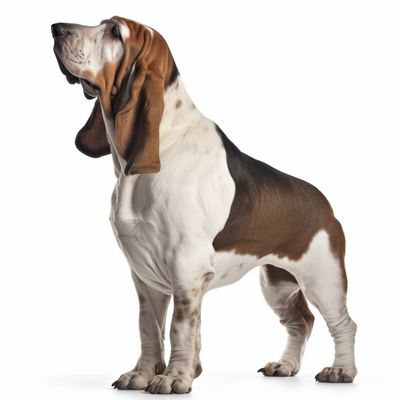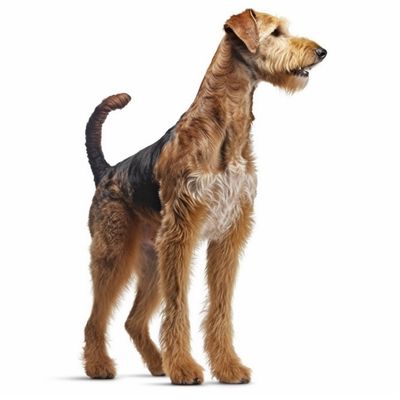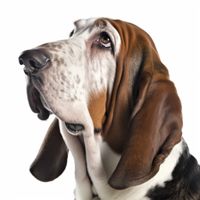Basset Hound - vs - Airedale Terrier - vs - Golden Retriever

Basset Hounds are medium-sized dogs, weighing 40-65 lbs, with a height of 11-15 inches.
Basset Hounds have a low energy level, enjoying leisurely walks and plenty of relaxation time.
Basset Hounds need minimal exercise, including short daily walks and playtime, to keep them happy and healthy.
Basset Hounds are intelligent but can be stubborn, making training a challenge. Consistent, positive reinforcement is key.
Basset Hounds are intelligent dogs, capable of learning a variety of commands and tasks, but their independent nature can make training challenging.
Basset Hounds can adapt to different living situations, but they require enough space to move comfortably and regular grooming.
Basset Hounds are gentle and patient, making them good with children when properly supervised.
Basset Hounds can get along well with other pets, especially when raised together. Early socialization is important.
Basset Hounds can tolerate colder temperatures, but their short coats require proper protection during extreme cold.
Basset Hounds can tolerate hot climates, but they need to be monitored for signs of overheating during exercise.
Basset Hounds have a short coat and shed moderately, requiring regular brushing to manage shedding.
Basset Hounds require regular grooming, including frequent brushing and occasional bathing to keep their coats clean and healthy. Their ears also require regular cleaning.
Basset Hounds bark occasionally, usually only when necessary or provoked.
Basset Hounds may experience some health issues and require additional care and attention, such as regular veterinary checkups, preventative care, and potential medication or treatments.

Airedale Terriers are medium-sized dogs, weighing 40-65 lbs, with a height of 22-24 inches.
Airedale Terriers have a high energy level and require regular exercise and mental stimulation.
Airedale Terriers need a significant amount of exercise, including daily walks, runs, and opportunities for play and exploration.
Airedale Terriers are intelligent and trainable, but can be independent thinkers. Consistent, positive reinforcement is essential.
Airedale Terriers are highly intelligent dogs and excel in various dog sports and activities, especially those involving agility and tracking.
Airedale Terriers can adapt to different living situations, but they need plenty of space and exercise to thrive.
Airedale Terriers are good with children when properly socialized and supervised.
Airedale Terriers can get along well with other pets, especially when raised together.
Airedale Terriers can tolerate colder temperatures, thanks to their dense, wiry coats.
Airedale Terriers can tolerate hot climates but need to be monitored for signs of overheating during exercise.
Airedale Terriers have a wiry coat that sheds minimally, making grooming relatively easy.
Airedale Terriers require regular grooming, including brushing and occasional hand-stripping or clipping to keep their coats clean and healthy.
Airedale Terriers have average bark tendencies and may bark for various reasons, such as alerting their owners or during playtime.
Airedale Terriers are generally healthy dogs but may still require regular veterinary checkups and preventative care.

Golden Retrievers weigh 55-75 lbs and stand 21-24 inches tall, boasting a strong and balanced build.
Goldens are enthusiastic and lively, always up for a game of fetch or a long walk in the park.
Daily exercise like walks, runs, or playtime is essential for a healthy and happy Golden.
Intelligent and eager to please, Goldens are a dream to train for both first-time and experienced owners.
Golden Retrievers are fast learners, excelling in problem-solving and grasping new skills.
Goldens adapt well to various living situations, from urban apartments to spacious rural homes.
Loving and patient, Golden Retrievers are gentle playmates and excellent family dogs.
Goldens are sociable and friendly, getting along with other dogs, cats, and even smaller pets.
Their dense double coats help them tolerate cold weather, but they still need warmth and shelter.
Goldens can cope with hot climates, but ensure they have shade, water, and avoid overexertion.
Goldens shed, especially during seasonal coat changes. Regular grooming helps manage shedding.
Routine brushing keeps a Golden's coat healthy, tangle-free, and controls shedding.
Golden Retrievers have average bark tendencies and may bark for various reasons, such as alerting their owners or during playtime.
Golden Retrievers are generally healthy, but regular veterinary checkups and preventative care are still necessary.



